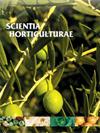Foliar spraying of potassium sulfate during fruit development comprehensively improves the quality of citrus fruits
IF 3.9
2区 农林科学
Q1 HORTICULTURE
引用次数: 0
Abstract
Sugar accumulation is influenced by various fertilizer treatments, of which potassium spraying is the most effective. However, the effect of different potassium sources as a foliar application at different fruit development stages on citrus fruits is still unclear. In this study, three different potassium fertilizers and one water (F1: 0.65% KNO3, F2: 0.88% KH2PO4, F3: 0.56% K2SO4, and F4: water) were sprayed on Citrus reticulata cv. Nanfeng at cell division, cell expansion, fruit ripening, and throughout fruit developmental stages, respectively. Results showed that the six-time K2SO4 application had the best function in enhancing fruit physiological attributes such as fruit weight and the total carotenoids; also, this treatment significantly decreased TA (titratable acid), increased fruit TSS (total soluble solids), soluble sugar content, and TSS:TA ratio. Furthermore, K2SO4 spraying obviously increased the expression of CsCWINV-2/6 in the segment membrane, and CsSUT-1/2 and CsVPP-1/2 in fruit juices. Taken together, six-time application of K2SO4 throughout fruit developmental stages produced better fruit quality, at least through enhancing sink strength and promoting sugar transportation in citrus fruits. This study might effectively contribute to maximizing fruit quality and its marketability.
在果实发育期叶面喷施硫酸钾可全面提高柑橘果实的品质
糖分积累受各种肥料处理的影响,其中喷施钾肥最为有效。然而,不同钾源在不同果实发育阶段的叶面喷施对柑橘果实的影响仍不清楚。本研究在南丰柑橘细胞分裂期、细胞膨大期、果实成熟期和整个果实发育期分别喷施了三种不同的钾肥和一种水(F1:0.65% KNO3;F2:0.88% KH2PO4;F3:0.56% K2SO4;F4:水)。结果表明,喷施六次 K2SO4 对提高果实重量和类胡萝卜素总量等果实生理特性的作用最佳;同时,该处理显著降低了可滴定酸 TA,提高了果实 TSS(总可溶性固形物)、可溶性糖含量和 TSS:TA 比值。此外,喷洒 K2SO4 能明显提高果实裂片膜上 CsCWINV-2/6 的表达,以及果汁中 CsSUT-1/2 和 CsVPP-1/2 的表达。综上所述,在柑橘果实的整个发育阶段喷洒六次 K2SO4,至少能通过增强柑橘果实的沉降强度和促进糖分运输来提高果实品质。这项研究可能会有效地促进果实质量及其销售能力的最大化。
本文章由计算机程序翻译,如有差异,请以英文原文为准。
求助全文
约1分钟内获得全文
求助全文
来源期刊

Scientia Horticulturae
农林科学-园艺
CiteScore
8.60
自引率
4.70%
发文量
796
审稿时长
47 days
期刊介绍:
Scientia Horticulturae is an international journal publishing research related to horticultural crops. Articles in the journal deal with open or protected production of vegetables, fruits, edible fungi and ornamentals under temperate, subtropical and tropical conditions. Papers in related areas (biochemistry, micropropagation, soil science, plant breeding, plant physiology, phytopathology, etc.) are considered, if they contain information of direct significance to horticulture. Papers on the technical aspects of horticulture (engineering, crop processing, storage, transport etc.) are accepted for publication only if they relate directly to the living product. In the case of plantation crops, those yielding a product that may be used fresh (e.g. tropical vegetables, citrus, bananas, and other fruits) will be considered, while those papers describing the processing of the product (e.g. rubber, tobacco, and quinine) will not. The scope of the journal includes all horticultural crops but does not include speciality crops such as, medicinal crops or forestry crops, such as bamboo. Basic molecular studies without any direct application in horticulture will not be considered for this journal.
 求助内容:
求助内容: 应助结果提醒方式:
应助结果提醒方式:


